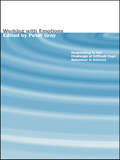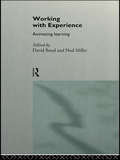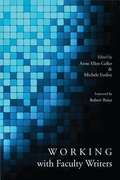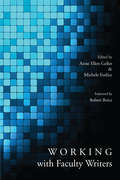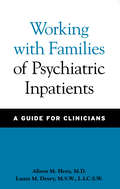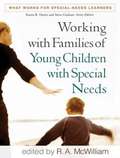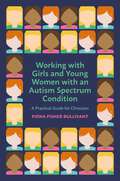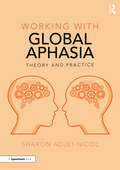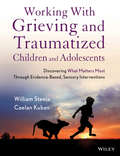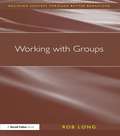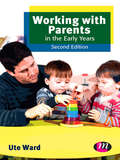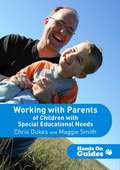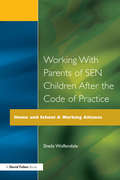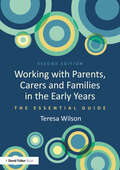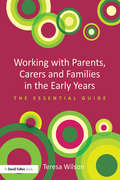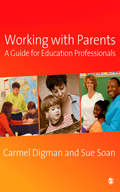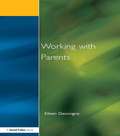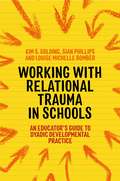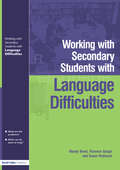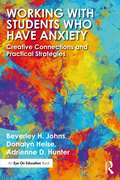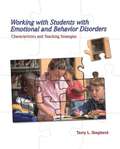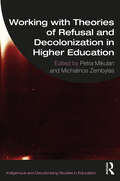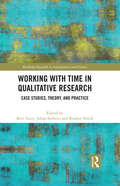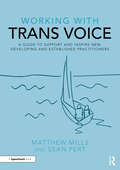- Table View
- List View
Working with Emotions: Responding to the Challenge of Difficult Pupil Behaviour in Schools
by Peter GrayDifficult pupil behaviour presents a number of issues for teachers, parents, other pupils as well as for children themselves. Inevitably it raises a number of emotions and challenges people's sense of their own personal effectiveness.This edited collection of short, concise chapters provides advice and guidance to professionals on how to respond to the emotions experienced and generated by pupils with behavioural difficulties in schools. Many chapters are written by such professionals themselves and address common problems in a practical and accessible way. Working with Emotions is an essential text for all schools, support services, LEAs, SENCOs and voluntary agencies and includes discussions on the government's current Social Inclusion initiative.
Working with Experience: Animating Learning
by David Boud Nod MillerEvery day we are confronted with problems and challenges which we address by drawing on our experience and by using this experience to find ways of learning what to do in new circumstances. Learning through experience is the normal, commonplace approach to learning and we take it for granted. Whilst much is known about teaching and being taught, far less attention has been given to learning in context - in particular, to learning outside the classroom. Yet this is in fact where most learning takes place. One possibly neglected area is the role which people, other than the learner, play in facilitating learning. This role is undertaken not only by teachers, trainers, parents and counsellors, but also by managers, supervisors, care-givers and friends. This book brings together the experiences of a number of practitioners, who write from often strongly contrasting perspectives. Such perspectives include feminism, Marxism, critical pedagogy, post-modernism and Gestalt, humanistic, clinical and transpersonal psychology.
Working with Faculty Writers
by Anne Ellen Geller Michele EodiceThe imperative to write and to publish is a relatively new development in the history of academia, yet it is now a significant factor in the culture of higher education. Working with Faculty Writers takes a broad view of faculty writing support, advocating its value for tenure-track professors, adjuncts, senior scholars, and graduate students. The authors in the volume imagine productive campus writing support for faculty and future faculty that allows for new insights about their own disciplinary writing and writing processes, as well as the development of fresh ideas about student writing. Contributors from a variety of institution types and perspectives consider who faculty writers are and who they may be in the future, reveal the range of locations and models of support for faculty writers, explore the ways these might be delivered and assessed, and consider the theoretical, philosophical, political, and pedagogical approaches to faculty writing support, as well as its relationship to student writing support. With the pressure on faculty to be productive researchers and writers greater than ever, this is a must-read volume for administrators, faculty, and others involved in developing and assessing models of faculty writing support.
Working with Faculty Writers
by Anne Ellen Geller Michele EodiceThe imperative to write and to publish is a relatively new development in the history of academia, yet it is now a significant factor in the culture of higher education. Working with Faculty Writers takes a broad view of faculty writing support, advocating its value for tenure-track professors, adjuncts, senior scholars, and graduate students. The authors in this volume imagine productive campus writing support for faculty and future faculty that allows for new insights about their own disciplinary writing and writing processes, as well as the development of fresh ideas about student writing. Contributors from a variety of institution types and perspectives consider who faculty writers are and who they may be in the future, reveal the range of locations and models of support for faculty writers, explore the ways these might be delivered and assessed, and consider the theoretical, philosophical, political, and pedagogical approaches to faculty writing support, as well as its relationship to student writing support. With the pressure on faculty to be productive researchers and writers greater than ever, this is a must-read volume for administrators, faculty, and others involved in developing and assessing models of faculty writing support.
Working with Families of Psychiatric Inpatients: A Guide for Clinicians
by Alison M. Heru Laura M. DruryWorking with the families of inpatients is one of the most important—and most challenging—aspects of practicing clinical psychiatry. Clinicians are responsible not only for the well-being of their patients but also for the education and guidance of the patient’s family. In this book, Alison M. Heru and Laura M. Drury offer a step-by-step guide to developing the skills needed to work successfully with patients’ families. Research data, outlined in the opening chapters, demonstrate just how essential families and evidence-based family treatment are to effective patient care. Succeeding chapters use clinical case studies to illustrate the skills necessary for the assessment and treatment of the family. Psychiatric residents will enhance their knowledge of the family as a part of the patient’s social context and learn how to conduct a family meeting, common mistakes to avoid, and when to refer the family for other assistance. The authors also describe specific strategies for intervening with difficult families and for overcoming some of the fears and anxieties common among residents when they interact with patients’ families.The authors provide valuable insights into the perspectives of families and patients and offer practical suggestions for risk management after the patient is discharged from inpatient care. Keyed to the requirements articulated by the American College of Graduate Medical Education, this handbook is a tool no psychiatric resident can do without.
Working with Families of Young Children with Special Needs
by R. McwilliamThis user-friendly book presents research-based best practices for serving families of children with special needs from birth to age 6. Expert contributors demonstrate how early intervention and early childhood special education can effectively address a wide range of family concerns, which in turn optimizes children's development and learning. Tightly edited, the volume offers indispensable tools for assessing families; identifying and capitalizing on their strengths; providing information, support, and coaching; collaborating with parents and teachers to address children's functional needs in the context of everyday routines; and coordinating care. Over a dozen reproducible checklists and forms help professionals immediately implement the techniques and strategies described.
Working with Girls and Young Women with an Autism Spectrum Condition: A Practical Guide for Clinicians
by Fiona Fisher BullivantThis guide shows how clinicians can help girls and young women with ASC to reach their full potential, by adopting more relationship-based, individualised approaches. With contributions from young women about their experiences in clinical settings, the book reflects on what clinicians have done right and wrong to date, why girls and women with ASC are too often misunderstood, and how the culture of how clinicians work with them needs to change in order to achieve better results. In a concise and practical way, it covers how to better understand clients' needs and foster strong relationships through diagnosis, understanding comorbidities, sensory issues, self-harm, emotional regulation, assessments, interventions and strategies.
Working with Global Aphasia: Theory and Practice (Working With)
by Sharon Adjei-NicolGlobal aphasia is the most severe and disabling form of aphasia, yet it has had the least attention within aphasia research and rehabilitation. This practical book provides the reader with a comprehensive understanding of the topic based on both clinical observations and the literature to date. Uniquely, it covers not only the severe language impairments observed in global aphasia but also the co-occurring cognitive impairments that often present an additional challenge when working with this population. This book offers: • A comprehensive understanding of the clinical characteristics of global aphasia illustrated with real case examples • A theoretical overview of the domains of cognition and discussion of the role cognitive deficits play in the clinical presentation of people with global aphasia • Critical analysis of the research evidence on global aphasia • An exploration into the strengths and limitations of common methods used to assess language, cognition, and functional communication in global aphasia • New ways of approaching assessment and treatment which consider the impact of cognitive difficulties • Detailed suggestions of direct and indirect treatment tasks and approaches that can be used with this population, including novel cognitive tasks. This accessible text will provide both experienced speech and language therapists and students new to the subject with the knowledge, skills, and tools to work effectively with people with global aphasia in a range of clinical settings. It will also be an essential resource for anyone considering research with this challenging but highly rewarding population.
Working with Grieving and Traumatized Children and Adolescents
by William Steele Caelan KubanA structured, sequential, and evidence-based approach for the treatment of children and adolescents experiencing trauma or grief. Working With Grieving and Traumatized Children and Adolescents features the Structured Sensory Interventions for Traumatized Children, Adolescents and Parents (SITCAP) intervention model, proven in successfully addressing violent situations such as murder, domestic violence, and physical abuse, as well as non-violent grief- and trauma-inducing situations including divorce, critical injuries, car fatalities, terminal illness, and environmental disasters.Filled with practical and proven activities for use with children and adolescents experiencing trauma and grief, this resource is based on the authors' experience working with all types of traumatic events in school-, agency-, and community-based programs across the country.
Working with Groups (nasen spotlight)
by Rob LongMany children with emotional and behavioral difficulties behave well in a one-to-one situation with an adult. It is when they are in a group with their peers that their behavior deteriorates dramatically. The more teachers understand about group dynamics, the better equipped they will be to support children who find such skills as turn-taking and sharing difficult. This book looks at: group skills managing difficult groups the group leader.
Working with Parents in Early Years Settings
by Ute WardThis book explores the ways in which Early Years practitioners work with parents and families to enhance children’s development, learning and well-being. It explores the need for close partnership working between staff and families, offers examples of good practice and encourages reflection and discussion of the issues involved. The book pays particular attention to the standards required to gain Early Years Professional Status but is of interest to anybody working in an Early Years setting or studying on Early Childhood courses.
Working with Parents in the Early Years (Early Childhood Studies Series)
by Ute WardThis book is written for all students of the Early Years. It begins by examining the role of a parent in a child's life and the importance of good working relationships between parents and Early Years practitioners. It goes on to discuss the preconceptions and assumptions that we all have about families and parents and considers the practical implications of working with parents in a respectful and trusting partnership. It explores both interpersonal and communication skills and the formal and informal ways of involving parents in the early years experience of their children. About the Early Years series This series has been designed to support students of degrees and foundation degrees in Early Years, Early Childhood and related disciplines. Each text takes a focused look at a specific topic and approaches it in an accessible and user-friendly way. Learning features help readers engage with the text and understand the subject from a number of different viewpoints. Tasks pose questions to prompt thought and discussion and further reading suggestions, including useful websites, are included to help students access extended learning in each topic. Other titles in the series are Early Childhood Studies, Becoming a Practitioner in the Early Years, Child Observation for the Early Years and Exploring Play for Early Childhood Studies. Ute Ward has been involved in the Early Years sector for more than 20 years in a range of different roles and contexts. In October 2011 Ute became Senior Lecturer in Early Years at the University of Hertfordshire where she teaches on Foundation Degrees and on undergraduate and postgraduate courses.
Working with Parents of Children with Special Educational Needs (Hands on Guides)
by Maggie Smith Chris DukesIncludes CD-Rom `This very timely book...aims to support practitioners to work in partnership with parents, particularly those parents whose children have special or additional needs...It very clearly sets out the principles, legislative framework and processes which are essential knowledge for all SENCOs and managers in early years settings' - Early Years Update `The book has a positive approach to all aspects of working with parents and children...It's a book you can easily dip in and out of and is written in plain English...There aren't many textbooks I can read from cover to cover but this is one - I found it really interesting and enlightening. Score - 10 out of ten' - National Childminding Association `In short, this book provides almost everything you need in order to work successfully with parents' - Early Years Educator Are you looking for advice on how to work successfully with parents? Every practitioner knows that it is vitally important to work well with parents and make the relationship a positive and productive one, to ensure the best support for the child with special educational needs. This book offers clear strategies for ways to forge successful and lasting relationships with parents. It includes: - advice on working together with parents to improve the child's learning - strategies for communicating effectively with parents - help for the pre-school SENCO, showing how they can lead the process - tips for building successful links with other related professionals - activities and case studies - a CD Rom with checklists and useful photocopiable material. This book is ideal for all those working with the 0 to 5 age range, such as pre-school practitioners, nursery managers, advisory teachers, SENCOs, Inclusion Officers and Child Care and Education students and tutors. Chris Dukes and Maggie Smith are both Area SENCOs who work closely with pre-school SENCOs and Managers on a daily basis.
Working with Parents of SEN Children after the Code of Practice (Home And School - A Working Alliance Ser.)
by Sheila WolfendaleFirst Published in 1997. Routledge is an imprint of Taylor & Francis, an informa company.
Working with Parents, Carers and Families in the Early Years: The Essential Guide
by Teresa WilsonParents have a crucial role in supporting children’s learning, development and wellbeing. Forming effective partnerships with families and carers is a key feature of the Early Years Foundation Stage. Achieving this takes time, reflective practice, skill and a solid understanding of the barriers that can impede forming effective working relationships with parents.Working with Parents, Carers and Families in the Early Years offers an informed and comprehensive framework for working with parents, drawing on the latest evidence and containing practical advice from practitioners and parents, to support sound partnership practice. This second edition has been fully updated to reflect the current economic and social challenges facing families and the increasing diversity of family structures.Full of examples and activities for training to support practice across a wide range of settings, it focuses on key areas such as: Working with parents of different aged children The development of strategies to support the relationship The barriers to partnership working, including sector challenges, social and cultural changes and time poverty Creating parent-friendly environments Reflecting on the events of the COVID-19 lockdown and the impact on partnership with parents Working with diverse families Including case studies and questions for reflective practice, this book will be ideal for early years students on Foundation Degrees, Childhood Studies courses and those training to become early years teachers as well as early years practitioners and managers responsible for staff training.
Working with Parents, Carers and Families in the Early Years: The essential guide
by Teresa WilsonParents have a crucial role in supporting children’s learning, development and well-being. The act of forming effective partnerships with families and carers is a key feature of the Early Years Foundation Stage. Achieving this takes time, reflective practice, skill and a solid understanding of the barriers that can impede forming effective working relationships with parents. This guide offers an informed and comprehensive framework for working with parents, drawing on the latest evidence and containing practical advice from practitioners and parents, to support sound partnership practice. Full of examples and activities for training and resources to support practice across a wide range of settings, it focuses on key areas such as: Working with parents of different aged children The development of strategies to support the relationship The barriers to partnership working, including cultural differences and working with hard to reach families Setting up home and setting visits Creating parent-friendly environments Including case studies and questions for reflective practice, this book will be ideal for Early Years students on Foundation Degrees, Childhood Studies Courses and those training to become Early Years teachers as well as Early Years practitioners and managers responsible for staff training.
Working with Parents: A Guide for Education Professionals
by Sue Soan Carmel Digman′This book would be excellent for anyone thinking of taking on the role of home/support worker or someone already in this post who would like to refresh their ideas and views. The book would also be of interest to those who want further insight into the complex role of the home/support worker′ - Nasen′s Special ′This book uses case studies across a range of ages to give practical advice on best practice when working with children and their parents in conjunction with other professionals….[T]he book contains much value to both class teachers and headteachers′ - Headteacher Update ′This realistic and wide-ranging book supports the work of a growing number of school-based support staff′ - Extended Schools Update ′This book helpfully covers the broad range of issues that home-school workers are likely to negotiate on a day to day basis. They give a realistic account of the challenges of working with parents from a school context, outlining a range of approaches, interventions, case studies and information to help practitioners provide effective support.′ - Jo Hook, Transition Information Sessions (TIS) Consultant - Family and Parenting Institute With the opening of Children′s Centres and the implementation of the Every Child Matters agenda, multi-agency working is now a reality. This book will provide advice and guidance on successful strategies to employ when working with parents and interdisciplinary staff. Using case studies to illustrate best practice across a range of age groups, the book looks at strategies for dealing with the effects of the following issues on children: o domestic violence o bereavement and loss o learning difficulties and special educational needs o neglect and poverty o anger and social, emotional and behavioural difficulties o addictions within the family. There is advice on working directly with children and examples are cited from children from 0 to 19. This book is an essential read for all those involved in the education and care of children.
Working with Parents: as Partners in Special Educational Needs
by Eileen GascoigneFirst Published in 1996. Routledge is an imprint of Taylor & Francis, an informa company.
Working with Relational Trauma in Schools: An Educator's Guide to Using Dyadic Developmental Practice (Guides to Working with Relational Trauma Using DDP)
by Kim Golding Louise Michelle Bombèr Sian PhillipsWritten by experienced clinicians, this book provides an exploration of how educators can easily use Dyadic Developmental Practice (DDP) to help vulnerable pupils to thrive.DDP is an intervention model for children and young people who have experienced trauma in past relationships. Safety and security is increased through offering emotional connection in a variety of ways, helped by the attitude of PACE (playfulness, acceptance, curiosity and empathy). The model gives children the opportunity to experience the relationships necessary for healthy development, emotional regulation and resilience. This book gives educators all the tools they need to embed DDP into their practice, including building connections with students, partnerships with parents, understanding the theory behind DDP, and overcoming the challenges of implementing it in practice. These principles can be adapted to support pupils at all levels.
Working with Secondary Students who have Language Difficulties
by Susan Robinson Mary Brent Florence GoughLanguage is the foundation of everything that goes on at school and is critical for formal learning and to interact socially. This book represents a whole school approach that includes tips for: identifying pupils with language learning difficulties following the book's simply explained guidelines; helping pupils overcome stumbling blocks by using the book's practical classroom strategies; modifying the schools curriculum to best support pupils with language learning difficulties; and timesaving resources in photocopiable format.
Working with Students Who Have Anxiety: Creative Connections and Practical Strategies
by Beverley H. Johns Adrienne D. Hunter Donalyn HeiseAs the number of students with anxiety increases in schools and classrooms, this book serves as the go-to guide for teachers and educators who strive to provide a welcoming environment conducive to students’ learning. Working with Students Who Have Anxiety provides an accessible understanding of anxiety in its various forms, how anxiety impacts academic and social skills, and what teachers can do to create a positive climate. An exciting new resource for teachers, special educators, art specialists, and school counselors, this book covers the causes, signs, and symptoms of anxiety; includes academic, behavioral, and art-based interventions; and explores ethical and legal issues relating to students with anxiety. Filled with real-life examples, practical teaching tips, and creative advice for building connections with students, this book not only provides readers with the latest information about anxiety but also focuses on strategies to give educators the real tools they need to reduce the negative impact of anxiety in academic settings.
Working with Students with Emotional and Behavior Disorders: Characteristics and Teaching Strategies
by Terry L. ShepherdThe book is about children who have been identified as having emotional and behavior disorders, those who have not been identified, those who are depressed and suicidal, and those who display aggressive behavior in the classroom. This book is a practical guide combining theory, best practices, strategies, and interventions and is useful for beginning teachers, seasoned teachers, alternatively certified teachers, counselors, parents, and administrators.
Working with Theories of Refusal and Decolonization in Higher Education (Indigenous and Decolonizing Studies in Education)
by Michalinos Zembylas Petra MikulanThis volume argues that refusal is a viable political ethics in education. It is an ethics that allows space for new possibilities to emerge, with the potential to enrich higher education study and pedagogies in the future. Chapters examine the ethical, epistemological, political and affective premises of refusing the colonial university, and reflect upon what refusal means for higher education decolonization across international settings. Refusal marks a political ethos and praxis that denies, resists, reframes and redirects colonial and neoliberal logics, while asserting diverse sovereignties and lifeworlds. Whereas resistance may reinscribe the weakness of the colonized in the power relations with the colonizer, refusal interrupts the smooth operation of power relations, denying the authority of the settler state and remaking the rules of engagement. It is a political stance and action that denies the very legitimacy of power over the subjugated. This collection views refusal not as an end in itself, nor as a mode of critique, but as a necessary first step for educators and students in higher education to invest in the idea of radically different modes of futurity. It explores how educators and students in higher education can invent pedagogies of refusal that function ethically, affectively and politically, and asks: What do pedagogies of refusal look like? How might western universities sustain and support refusal, rather than discipline it? What assumptions are sustained by ruling out certain educational futures as out of bounds, or impossible? This book will be important reading for researchers, scholars and educators in Decolonizing Education, Higher Education Transformation, and Philosophy of Education. It will also be valuable to policymakers and activists who are considering how refusal might be carried out within and outside institutions.
Working with Time in Qualitative Research: Case Studies, Theory and Practice (Routledge Research in Anticipation and Futures)
by Keri FacerThis volume creates a conversation between researchers who are actively exploring how working with and reflecting upon time and temporality in the research process can generate new accounts and understandings of social and cultural phenomena and bring new ways of knowing and being into existence. The book makes a significant contribution to the enhancement of the social sciences and humanities by charting research methods that link reflectively articulate notions of time to knowledge production in these areas. Contributors explore how researchers are beginning to adopt tactics such as time visibility, hacking time, making time, witnessing temporal power and caring for temporal disruptions as resources for qualitative research. The book collects fields as disparate as futures studies and history, literary analysis and urban design, utopian studies, and science and technology studies, bringing together those who are working with temporality reflexively as a powerful epistemological tool for scholarship and research inquiry. It surfaces and foregrounds the methodological challenges and possibilities raised. In so doing, this collection will serve as a resource for both new and experienced researchers in the humanities and social sciences, seeking to understand the tools that are emerging, both theoretical and methodological, for working with time as part of research design. This book will be of great interest to students and scholars of research methods, time and temporality, future studies, and the environmental humanities.
Working with Trans Voice: A Guide to Support and Inspire New, Developing and Established Practitioners (Working With)
by Matthew Mills Sean PertThis book is an essential resource for those new to, developing and established in the field of trans voice. Presented in a workbook style and packed with practical exercises for the practitioner to engage with, it explores and explains how to work with clients effectively, while also developing vital cultural knowledge and fundamental skills in voice coaching that will help the practitioner develop insight into and support each person’s unique journey. Matthew Mills and Sean Pert draw on their wealth of experience to encourage the reader to consider what gender means to them, and how gender performance may be taken for granted by people whose gender identity aligns with their sex assigned at birth. The key learning points of this book are illustrated by guiding comments from trans and non-binary people with lived, practical and clinical experience Based on the latest expert practice and informed by the experiences of the clients themselves, Working with Trans Voice allows speech and language therapists and other professionals interested in supporting trans and gender-diverse people to develop the confidence to work with their clients in partnership and solidarity.
